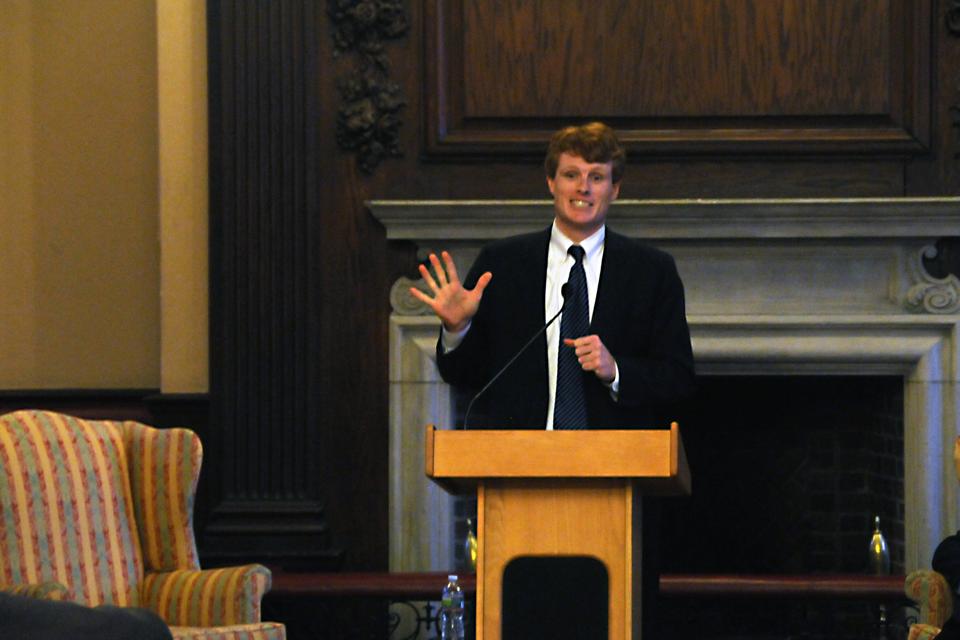
News
Harvard Lampoon Claims The Crimson Endorsed Trump at Pennsylvania Rally

News
Mass. DCR to Begin $1.5 Million Safety Upgrades to Memorial Drive Monday

Sports
Harvard Football Topples No. 16/21 UNH in Bounce-Back Win

Sports
After Tough Loss at Brown, Harvard Football Looks to Keep Ivy Title Hopes Alive

News
Harvard’s Greenhouse Gas Emissions Increased by 2.3 Percentage Points in 2023
Joseph P. Kennedy III Speaks at Winthrop

Congressional candidate Joseph P. Kennedy III ventured out of the Fourth Congressional District Tuesday night to make a campaign stop of sorts at Winthrop House, where he was the inaugural speaker in the Perini-Woods Memorial Speaker Series. His address, part campaign stump speech, part motivational charge, called on young people to become politically engaged and help turn the country around.
“You are an essential part of this conversation. Not only because of the contributions each of you can make to a campaign, but also because the choices that politicians are making now down in Washington will have a dramatic impact on your generation, my generation, our generation,” the 31-year-old Kennedy said.
Youth was the subject of much of his speech and much of Kennedy’s still-unfolding Congressional campaign to fill the seat vacated by long-time Representative Barney Frank ’61-’62.
The Perini-Woods Memorial Speaker Series was announced in March to commemorate two members of the class of 1986 who died shortly after graduation.
According to Winthrop House Master Ronald S. Sullivan Jr., the decision to invite Kennedy as the inaugural speaker was not accidental. Not only a rising political candidate, Kennedy was also a logical choice because of his family’s historic tie to the house.
Indeed, any political appearance by a Kennedy at Harvard is liable to cast a glance back at history. The speech at Winthrop on Tuesday was in part a coming home for Kennedy, whose grandfather Robert F. Kennedy ’48 and great-uncle John F. Kennedy ’40 were both Winthrop House residents. As part of his visit, Kennedy toured the former president’s suite in Winthrop and knocked on the door of his grandfather’s room across the hall.
Perhaps appropriately, Kennedy’s speech leaned heavily on his family’s intellectual legacy. Referring to a speech his grandfather delivered in South Africa in 1965, Kennedy called for youth to reinvigorate the political arena.
“We are not too young, too naïve, or too inexperienced to demand change,” Kennedy said. “We are exactly the ones to drive it.”
“There’s an old rule of thumb in politics that 90 percent of all 90 year-olds vote and 25 percent of all 25 year-olds vote. In the 2008 election, you helped change that,” Kennedy added. “But now it’s up to you again to help decide if that was the exception or the rule.”
Kennedy also spent a good portion of the speech discussing his own experience and background, including his work in the Peace Corps, at the Harvard Legal Aid Bureau, and as an assistant district attorney—points that have, to those following his candidacy, become increasingly familiar. Within these descriptions, the recent Harvard Law School grad highlighted the similarities that he shares with many Harvard students and alumni.
Kennedy used his experiences in pubic service as a springboard to talk about his current campaign, sharing stories from the trail and some of his own political views.
Kennedy is considered the frontrunner to replace Frank in the Fourth District in November’s election. In the most recent poll, Kennedy held a nearly 2-to-1 lead over his foremost Republican opponent, Sean Bielat.
—Staff writer Nicholas P. Fandos can be reached at nicholasfandos@college.harvard.edu.
Want to keep up with breaking news? Subscribe to our email newsletter.
